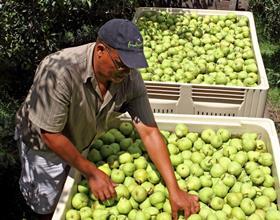
Although the South African apple sector is very much on target with its export volumes thi season, the effect of the Covid-19 pandemic is clearly reflected in what has been shipped to key markets.
For years now the South African apple sector has worked consistently to reduce its dependence on its traditional markets in Europe and the UK.
They have been remarkably successful as is demonstrated by the fact that the Far East, Asia and Africa are now the most important markets. These regions, despite the difficulties, have so far this season received 51 per cent of all exports.
This, however, do not tell the full story. So far this season shipment to Africa has dropped by 13 per cent compared to last year, and to the Far East and Asia by 14 per cent.
The 14.8m cartons shipped so far is just slightly less than last year year’s figure at the same time of the season. The slack has been taken up by the Middle East and Europe, with the UK holding steady on just slightly less than last year.
It could have been so different. With a bumper crop of just over 36m cartons, the highest in three years, South Africa was set to consolidate its position in the East.
With a higher oil price towards the end of last year and early this year promising a strong recovery of the oil-based African economies, and therefore increased demand for fresh produce, in Africa things could also have been very different.
Veteran apple industry leader Alastair Moodie said that one would expect in countries dependent on wet and street markets, the effect of the coronavirus would be felt more than in others. “It is one of those seasons where one has to work double as hard and stay the distance to market the crop.”
In general the industry has been focusing on packing and shipping as fast as possible, and its task has not been made easy by a lack of containers and then delays in loading activities in the port of Cape Town, from where the biggest portion of the apple crop is shipped.
Exporters often have to move containers to Port Elizabeth and Ngqura container terminal just outside the Eastern Cape port city.
With the pear crop some 10 per cent down on last year, shipments to date also reflect this decline. Europe, the Middle East and Africa have been the major receivers.



